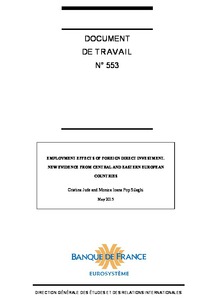Employment effects of foreign direct investment. New evidence from Central and Eastern European countries
"This paper examines the role of foreign direct investment (FDI) as a determinant of employment by using a dynamic labor demand model applied for a panel of 20 Central and Eastern European Countries during the period 1995-2012. Our results indicate that FDI leads to a phenomenon of creative des...
| Main Authors: | , |
|---|---|
| Institution: | ETUI-European Trade Union Institute |
| Format: | TEXT |
| Language: | English |
| Published: |
Paris
2015
Banque de France |
| Subjects: | |
| Online Access: | https://www.labourline.org/KENTIKA-19112711124919309939-employment-effects-of-foreign-.htm |
| Summary: | "This paper examines the role of foreign direct investment (FDI) as a determinant of employment by using a dynamic labor demand model applied for a panel of 20 Central and Eastern European Countries during the period 1995-2012. Our results indicate that FDI leads to a phenomenon of creative destruction. The introduction of labor saving techniques leads to an initial negative effect on employment, while the progressive vertical integration of foreign affiliates into the local economy eventually converges towards a positive long run effect. However, this phenomenon is only observed in EU countries. Our analysis thus gives partial support to the worries that FDI may displace jobs. Still, the relative importance of FDI as a determinant of employment is modest compared to economic restructuring and output growth. Finally, our results show evidence of a skill bias of production in foreign affiliates, as human capital favors a positive contribution of FDI to employment." |
|---|---|
| Physical Description: | 35 p. Digital |

